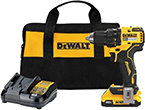Circuit breakers have one purpose and one purpose only: To interrupt electrical currents in your home when there is a sudden surge in the electrical lines. This safety feature is necessary to help protect your wiring, and therefore the costly electrical equipment in your home, like your television or computer. It also helps to prevent fires that could be caused by overheated electrical lines.
Before replacing a circuit breaker you need to determine whether or not the circuit breaker actually needs replacing—it could just be tripped. To check this out, take a look at the breaker box, which is usually located in a basement, laundry room, or utility room. Locate the breaker that is giving you problems. Firmly move the breaker switch towards the off position to reset it, then over to the on position. If it trips again immediately, then you probably have a bad circuit breaker that needs to be replaced.
Write down any identifying information about the problem breaker. If it has a manufacturer's name on it or any numbers, jot them down on a piece of paper and head off to your local hardware or home improvement store. Use the information to find a matching replacement breaker and then take it home. Here's how you then proceed:
If the same breaker trips again, then you have a more serious problem. In such a case, it is a good idea to immediately call an electrician. You might have a short in your wiring, which could be dangerous and cause a fire or other type of damage to your home.

Cordless, Compact, and Powerful! DeWalt's 20-volt drill-driver kit packs a big punch in a small package, with a powerful high-performance motor tucked away inside a compact design. A great addition to the tool chest of any professional or DIYer! Check out DeWalt 20-Volt Drill/Driver Kit today!
Do you want a home theater system that is going to make you the envy of your friends? How about one that can make your ...
Discover MoreJust because you want some lighting outside doesn't mean that you have to be using a whole lot of energy to do it. One of ...
Discover MoreIf you're thinking about installing solar panels to help cut down on your electricity usage, contact a solar panel ...
Discover MoreThere are currently no comments for this tip. (Be the first to leave your comment—just use the simple form above!)
Copyright © 2025 Sharon Parq Associates, Inc.
Comments